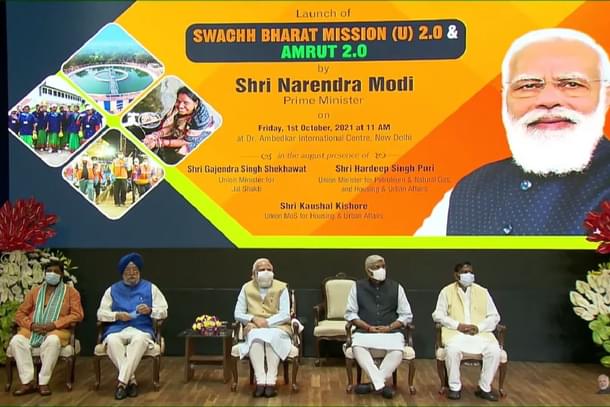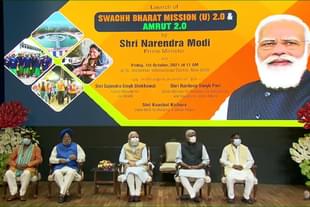News Brief
Making Cities Water Secure: Cabinet Gives Green Light To Next Phase Of Swachh Bharat Mission And AMRUT
Arun Kumar Das
Oct 13, 2021, 10:50 AM | Updated 10:42 AM IST
Save & read from anywhere!
Bookmark stories for easy access on any device or the Swarajya app.


The Union cabinet, chaired by Prime Minister Narendra Modi, has approved two crucial initiatives for urban areas to make cities water secure and open defecation free (ODF).
It was decided for the continuation of Swachh Bharat Mission (Urban) or SBM-U 2.0 until 2025-26, with focus on sustainability of ODF outcomes, achieving scientific processing of solid waste in all cities, and managing wastewater in cities with less than 1 lakh population.
Besides, it was also approved the Atal Mission for Rejuvenation and Urban Transformation 2.0 (AMRUT 2.0) will continue until 2025-26, as a step towards Atmanirbhar Bharat, and with the aim of making the cities ‘water secure’ and ‘self-sustainable’ through a circular economy of water.
The cabinet decision envisages that providing reliable and affordable water supply and sanitation services to urban households is a national priority.
Apart from complete elimination of open defecation, Swachh Bharat Mission SBM-U 2.0 targets fecal sludge management in all cities with less than 1 lakh population with a financial outlay of Rs 141,600 crore, which is 2.5 times more than the first phase of the mission.
The mission aims to provide 2.68 crore tap connections and 2.64 crore sewer/septage connections to achieve the intended outcomes.
The SBM-U 2.0 also aims to ensure eradication of hazardous entry into sewers and septic tanks while preventing untreated wastewater flowing into water bodies.
As per the AMRUT 2.0, all cities have to achieve at least three-star garbage free certification until 2025-26 with an outlay of Rs 277,000 crore.
AMRUT 2.0 also targets universal coverage of water supply by providing household tap connections in all 4,378 statutory towns while providing reliable and affordable water supply and sanitation services to urban households.
Other key features of AMRUT 2.0 include Pey Jal Survekshan which will encourage competition among cities for benchmarking urban water services. The mission will also encourage mobilisation of market finance by mandating implementation of 10 per cent of worth of projects in cities with population above 10 lakh through public private participation.
Entrepreneurs/startups will be encouraged in the water ecosystem. Information education and communication (IEC) campaign will be undertaken to spread awareness among masses about water conservation.
The mission has a reform agenda focussed towards financial health and water security of urban local bodies (ULB). Meeting 20 per cent of water demand through recycled water, reducing non-revenue water to less than 20 per cent and rejuvenation of water bodies are major water related reforms.
Reforms on property tax, user charges and enhancing credit worthiness of ULBs are other important reforms. ULBs will be rewarded with incentive on accomplishing the reforms.
Arun Kumar Das is a senior journalist covering railways. He can be contacted at akdas2005@gmail.com.





